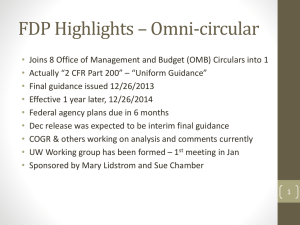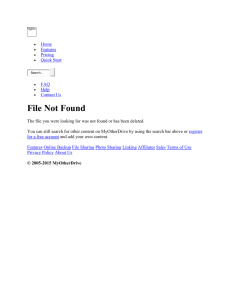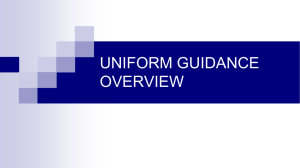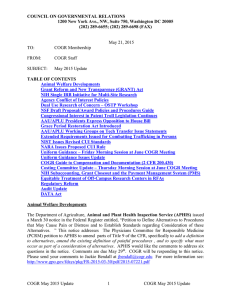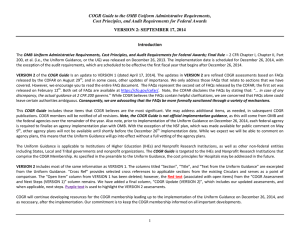COFAR – COGR Review: OMB Uniform Administrative Requirements, Cost Principles,
advertisement
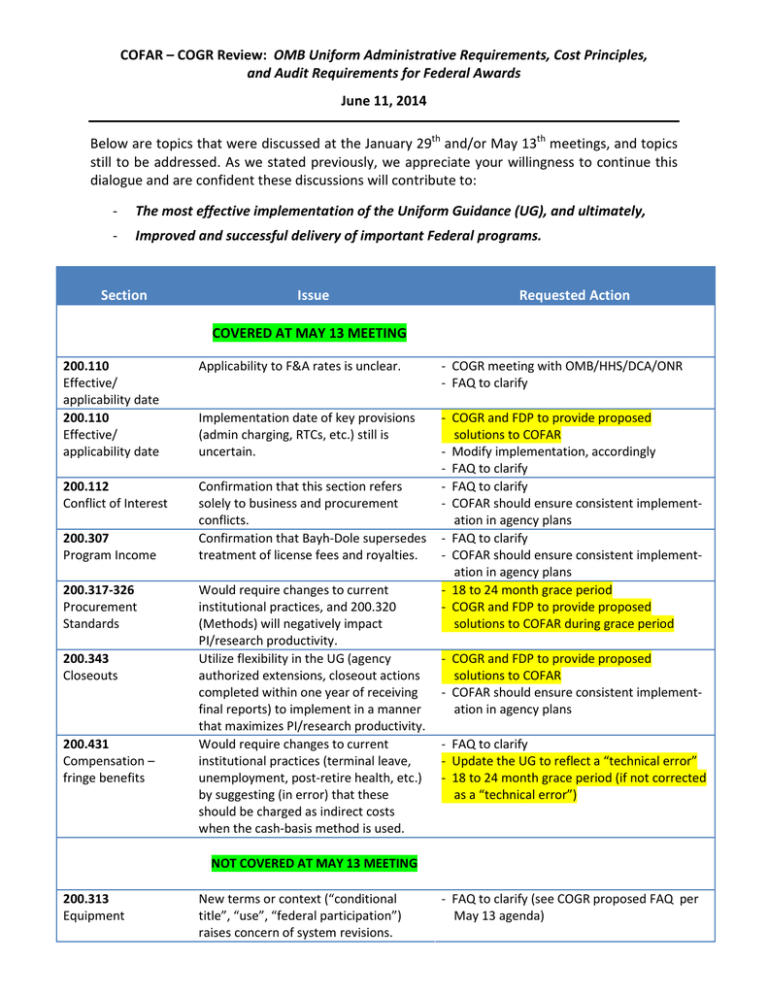
COFAR – COGR Review: OMB Uniform Administrative Requirements, Cost Principles, and Audit Requirements for Federal Awards June 11, 2014 Below are topics that were discussed at the January 29th and/or May 13th meetings, and topics still to be addressed. As we stated previously, we appreciate your willingness to continue this dialogue and are confident these discussions will contribute to: - The most effective implementation of the Uniform Guidance (UG), and ultimately, - Improved and successful delivery of important Federal programs. Section Issue Requested Action COVERED AT MAY 13 MEETING 200.110 Effective/ applicability date 200.110 Effective/ applicability date Applicability to F&A rates is unclear. - COGR meeting with OMB/HHS/DCA/ONR - FAQ to clarify Implementation date of key provisions (admin charging, RTCs, etc.) still is uncertain. 200.112 Conflict of Interest Confirmation that this section refers solely to business and procurement conflicts. Confirmation that Bayh-Dole supersedes treatment of license fees and royalties. - COGR and FDP to provide proposed solutions to COFAR - Modify implementation, accordingly - FAQ to clarify - FAQ to clarify - COFAR should ensure consistent implementation in agency plans - FAQ to clarify - COFAR should ensure consistent implementation in agency plans - 18 to 24 month grace period - COGR and FDP to provide proposed solutions to COFAR during grace period 200.307 Program Income 200.317-326 Procurement Standards 200.343 Closeouts 200.431 Compensation – fringe benefits Would require changes to current institutional practices, and 200.320 (Methods) will negatively impact PI/research productivity. Utilize flexibility in the UG (agency authorized extensions, closeout actions completed within one year of receiving final reports) to implement in a manner that maximizes PI/research productivity. Would require changes to current institutional practices (terminal leave, unemployment, post-retire health, etc.) by suggesting (in error) that these should be charged as indirect costs when the cash-basis method is used. - COGR and FDP to provide proposed solutions to COFAR - COFAR should ensure consistent implementation in agency plans - FAQ to clarify - Update the UG to reflect a “technical error” - 18 to 24 month grace period (if not corrected as a “technical error”) NOT COVERED AT MAY 13 MEETING 200.313 Equipment New terms or context (“conditional title”, “use”, “federal participation”) raises concern of system revisions. - FAQ to clarify (see COGR proposed FAQ per May 13 agenda) COFAR – COGR Review June 11, 2014 Section Issue Requested Action 200.201 & .332 Fixed amount awards (and Subawards) “Prior approval” for subawards up to the SAL is problematic for commonly used fixed agreements (clinical trials, foreign, etc.). Also, raises issue if fixed amount subawards can be used above the SAL. Finally, confirmation needed that “profit” (200.400g) restrictions are not meant to be applicable to fixed awards. FAQ IV-1 does not fully clarify that institutional contribution is allowable. Disallowance would be a major change in Federal policy and would create a disincentive to accept assistance for the construction of buildings/equipment. Confirmation is needed that contractor (vendor) agreements exceeding $25k are subject to F&A. Per F&A rate agreements, all contractor agreements (at all dollar levels) are subject to F&A. Some agencies interpret the exclusion over $25k to be applicable to contractor (vendor) agreements. IHEs need more certainty on the approval process. There is an equity issues since IHEs below the $50 million threshold and other non-federal entities are not subject to the DS-2. New monitoring requirements will add new and significant burden to prime recipients, especially for subs that are no longer covered by the single audit. - FAQ to clarify - Implement exceptions for research - COFAR should ensure consistent implementation in agency plans 200.436 Depreciation 200.330 Subrecipient and contractor determinations 200.419 CAS and disclosure statement 200.331 Requirements for pass-through entities 200.430 Compensation – personal services Helpful section that allows institutions to utilize alternatives to effort reporting. 200.303 Internal Controls 200.301 Performance Measurement 200.335 Methods for collection, storage … App III, C.8 Limitation on reimbursement of admin costs FAQ III-4 is helpful; the Green Book and COSO are useful guides, not reqs. OMB-approved governmentwide standard information collections, such as the RPPR, are acceptable. Helpful section that formalizes and standardizes the use of electronic records. The UG restricts an IHE from changing accounting methods if the effect is to change the charging of a cost from F&A to direct. This is unique to IHEs. 2 - Update the UG to reflect a “technical error” - Revised FAQ to clarify - FAQ to clarify - COFAR should ensure consistent implementation in agency plans - COGR meeting with OMB/HHS/DCA/ONR - COFAR could establish “fast-track” approvals that do not necessitate changes to the DS-2 (e.g., admin/compute device charging/etc.) - FAQ to clarify - COGR engagement with COFAR to simplify pass-through’s role in management decisions - COGR/FDP engagement with COFAR to establish “audit-review-waiver” when the sub is a peer, subject to the single audit - FAQ to clarify role of DS-2 approval - COFAR could facilitate meetings with COGR and the audit community to monitor new practices and their acceptance - Incorporate the FAQ into the annual publication of the Compliance Supplement - COFAR should ensure consistent implementation in agency plans - OMB could facilitate a meeting with COGR and the FAR Council to address consistency between the FAR and the UG - COGR/FDP engagement with COFAR to establish new models of direct charging that promote cost-effectiveness across Federal programs
